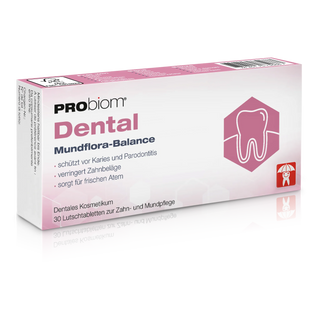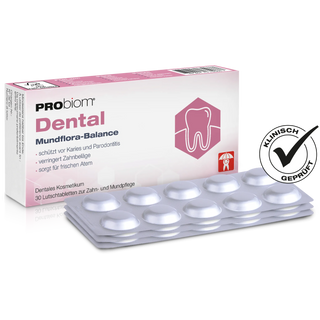Bad breath – medically known as halitosis – is a taboo subject for many people. Yet it affects far more people than one might think: Estimates suggest that one in four adults regularly suffers from bad breath. What many people don't realize is that bad breath isn't just an aesthetic problem or a result of poor dental care. In many cases, it's caused by a serious underlying condition.
This article comprehensively examines which diseases can cause bad breath , how to recognize them, what accompanying symptoms occur, and what can be done to combat them. We'll examine not only the classic causes in the oral cavity, but also diseases of the stomach, metabolism, respiratory system, and more.
What is bad breath actually?
Before we address the causes, it's helpful to define bad breath from a medical perspective. Doctors distinguish between two types:
-
Foetor ex ore : Bad smell when exhaling through the mouth.
-
Halitosis : Bad breath that occurs when breathing out through both the mouth and nose – often a sign of systemic disease.
Bad breath is caused by volatile sulfur compounds (VSCs), which are formed when bacteria break down proteins. These include hydrogen sulfide, methyl mercaptan, and dimethyl sulfide – substances with a very strong odor. Depending on their source, they can indicate certain diseases.
The role of bacteria in the mouth
In approximately 80–90% of cases, the cause of bad breath can be found in the oral cavity itself . The tongue, interdental spaces, and gum pockets in particular provide ideal niches for bacteria that produce odorous substances.
Typical triggers in the mouth are:
-
Tongue coating
-
Periodontitis (gum inflammation)
-
caries
-
Dry mouth (xerostomia)
-
Poor oral hygiene
But if, despite intensive care, your breath remains unpleasant or is accompanied by other symptoms, you should pay attention – because bad breath can then be an alarm signal for serious illnesses.
Diseases that can cause bad breath
The following table provides an initial overview of diseases that can be associated with strong bad breath:
| Illness | Typical smell | Accompanying symptoms |
|---|---|---|
| Periodontitis | putrid, purulent | Bleeding gums, receding gums |
| caries | sour, rotten | Toothache, visible holes in the tooth |
| tonsillitis | musty | Sore throat, fever, difficulty swallowing |
| Reflux disease (GERD) | sour, acidic | Heartburn, belching, hoarseness |
| Helicobacter pylori infection | rotten, sour | Stomach pain, nausea, loss of appetite |
| Diabetes mellitus (ketoacidosis) | sweet, acetone-like | Fatigue, weight loss, intense thirst |
| Liver failure | putrid, "liver-foetor" | Jaundice, fatigue, nausea |
| kidney failure | urine-like, ammonia-like | Edema, high blood pressure, difficulty concentrating |
| Bronchiectasis | purulent, mucous | Chronic cough, sputum, shortness of breath |
| Tumors in the neck/pharynx area | musty, rotting | Hoarseness, difficulty swallowing, weight loss |
Below we take a closer look at these diseases.
1. Periodontitis – inflammation of the periodontal ligament
One of the most common causes of chronic bad breath is periodontitis. This is a bacterial inflammation of the gums that, if left untreated, leads to bone loss. Particularly aggressive bacteria such as Porphyromonas gingivalis decompose tissue and produce foul-smelling gases.
It is characterized by a foul odor, accompanied by bleeding gums, loosening of teeth, and receding gums. Early dental treatment is essential to prevent tooth loss.
2. Chronic tonsillitis (tonsillitis)
When tonsils are frequently inflamed, food debris, dead cells, and bacteria accumulate in the tonsil pits. These so-called tonsil stones (tonsilloliths) are a real odor bomb – they consist largely of sulfur compounds and can have a very unpleasant odor.
A typical symptom is a musty smell that persists despite dental care. Sometimes the white stones can even be squeezed out with a finger or cotton swab.
3. Helicobacter pylori and stomach diseases
The stomach bacterium Helicobacter pylori is known for its role in stomach ulcers, gastritis, and in some cases even stomach cancer. It can also affect breathing: When the bacterium produces gas, it enters the oral cavity through burping.
People with H. pylori often suffer from bloating, a feeling of fullness, and bad breath, which is described as foul and sour. Diagnosis via breath test or gastroscopy can provide clarity.
4. Reflux disease (GERD)
In reflux disease, stomach acid enters the esophagus—sometimes even into the mouth. This not only causes heartburn but also a sour breath, especially in the morning or after lying down.
Stomach acid can also irritate the gums, promote bacterial growth and disrupt the oral flora in the long term.
5. Diabetes mellitus – When your breath smells sweet
Sweet, fruity breath is a well-known sign of diabetic ketoacidosis—a potentially life-threatening metabolic disorder. In this disorder, fatty acids are burned instead of glucose, producing ketone bodies such as acetone, which are exhaled.
This form of bad breath often occurs in people with untreated or poorly controlled type 1 diabetes and should be immediately checked by a doctor.
6. Renal insufficiency – “urine smell” on the breath
In advanced kidney failure (uremia), substances that are normally excreted through the kidneys accumulate in the body. Some of these waste products enter the air we breathe, causing an ammonia-like or urine-like odor .
Those affected often also complain of chronic fatigue, nausea, and itchy skin. If suspected, a nephrologist should be consulted urgently.
7. Liver insufficiency – foetor hepaticus
Severe liver disease—such as liver cirrhosis—can lead to what's known as fetor hepaticus : an intense, sweetish, foul odor in the breath. This is caused by sulfur-containing substances that accumulate in the blood and are excreted through the lungs.
Yellowing of the skin (jaundice), weight loss, and concentration problems often occur. Liver disease is a serious cause and requires comprehensive diagnostics.
8. Tumors in the neck, throat or nose area
Tumors in the mouth, throat, or sinuses sometimes cause tissue decay, producing a musty, rotting odor. Especially with tumors that grow unnoticed, bad breath is one of the first warning signs.
Other symptoms include persistent sore throat, difficulty swallowing, lumps in the neck, or weight loss. In these cases, prompt evaluation by an ENT specialist or oncologist is important.
9. Respiratory infections
Chronic bronchitis, lung abscesses, or bronchiectasis can lead to foul-smelling breath—especially when purulent sputum is produced. The odor is caused by decomposition processes in the bronchial secretions.
Patients often complain of chronic cough, shortness of breath, or frequent infections. Pulmonological evaluation is also recommended here.
When to see a doctor?
Not all bad breath indicates disease—occasionally, it's simply the result of garlic, coffee, or a dry mouth. However, if the smell occurs regularly, persists despite intensive dental care, and is accompanied by other symptoms, you should seek medical advice.
Warning signs are:
-
Sweet or foul breath despite dental care
-
Persistent tongue coating or coated tongue
-
Recurring sore throat or stomach upset
-
Unexplained weight loss or fatigue
-
Breath odor with a chemical note (acetone, ammonia)
Diagnostic options
Depending on the suspicion, various diagnostic procedures are available:
-
Oral examination at the dentist
-
Tongue swab or microbiological analysis
-
Breath tests (e.g., BH pylori, ketones)
-
Blood values (kidney, liver, glucose)
-
Ear, nose and throat examination
-
Gastroenterological diagnostics
Interdisciplinary cooperation between dentists, internists and ENT specialists is often helpful in cases of unclear halitosis.
Conclusion: Take bad breath seriously – protect your health
Bad breath is more than just a cosmetic problem. It can be a sign of serious illnesses such as diabetes, liver or kidney disease, stomach problems, or even tumors. Therefore, it shouldn't be tabooed or ignored.
Anyone who regularly suffers from bad breath should not only review their dental hygiene but also seek medical advice to determine whether a systemic condition is present. If detected early, many causes can be treated effectively – and your breath will be fresh again.













